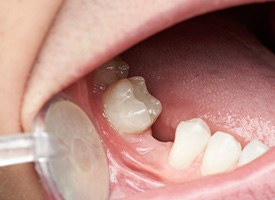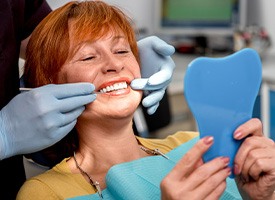Dentures and Partials – Acworth, GA
Reliable Replacements for Missing Teeth

No one sets out to lose teeth as they get older. Unfortunately, depending on your oral hygiene and lifestyle habits, as well as your overall health, losing your natural teeth can be a reality. Without proper treatment, your oral health, facial structure, and self-esteem can begin to decline. Fortunately, our team at Biologic Dentistry want to stop these problems by providing safe and reliable solutions – dentures and partials. Whether you’re missing several or all your teeth, these restorative treatments can have you enjoying a new and improved smile that is natural-looking and functional. To find out how you can take back your smile, contact us to schedule an appointment.
What is a Full Denture?

A full denture is used to replace a person’s entire row of teeth. Full dentures can be created to replace the top or bottom arch, or both, depending on the patient’s individual needs. Using a gum-colored base that is designed to blend in with the mouth and gums, artificial teeth are situated on top of the base. If a patient has any natural teeth remaining, lab technicians will craft the denture in a way, so it matches the size, shape, and color of nearby teeth.
Top dentures are made to cover the entire roof of the mouth, while bottom dentures look more like a horseshoe to ensure enough room for the tongue.
What is a Partial Denture?

Partial dentures are for patients who have several missing teeth along a row. Fitting much like a puzzle piece, it is designed in a similar way as a full denture, only the gum-colored base includes artificial teeth in the areas where teeth are missing along a row.
Partials are held into place using clasps or clips that are attached to natural teeth, keeping it secure and giving patients greater peace of mind knowing their restoration will not slip or fall out.
Who’s a Good Candidate for Dentures?

Our team understands the toll missing teeth can take on an individual, but by providing a restorative solution such as full and partial dentures, we can help patients feel better about their smile and their overall appearance. Patients who have lost all or some of their natural teeth and who desire a full, complete smile can be prime candidates for dentures. It is also possible for patients who have experienced tooth loss as a result of gum disease, injury, or serious decay to find hope with full or partial dentures. To learn more about your candidacy, continue reading!
Effects of Missing Teeth

Tooth loss is most often caused by tooth decay, gum disease, or injuries from accidents like falls or sports activities. Losing teeth not only affects your smile but also impacts your jawbone's health. Teeth provide essential stimulation to the jawbone during chewing, keeping it strong and healthy. Without this stimulation, the jawbone can shrink and recede, leading to problems such as facial sagging, speech difficulties, challenges with eating, and reduced self-confidence.
What Qualifies You for Dentures?

Dentures are a great option for patients who have lost one or more teeth or experience sensitivity, provided they have healthy gum tissue and jawbones. Keeping these in excellent condition requires diligent oral hygiene. Additionally, dentures are typically more affordable than other tooth-replacement methods, making them a great choice for patients on a budget.
The best type of denture for you depends on how many teeth you’re missing. Partial dentures are ideal for replacing one or a few missing teeth, while full dentures are better suited for those who have lost most or all their teeth. For patients seeking maximum chewing efficiency, implant dentures are a fantastic option. These are secured with titanium posts surgically placed in the jaw, offering enhanced stability and function.
Alternative Tooth-Replacement Options

While dentures are an excellent solution for many people with missing teeth, they may not be the right choice for everyone. Fortunately, there are alternative tooth-replacement options to consider, including:
- Dental Bridges – Ideal for replacing one or several consecutive missing teeth, these are supported either by crowns placed on the adjacent teeth or by dental implants anchored in the jawbone.
- Dental Implants – A highly durable, lifelike, and functional option for replacing missing teeth. These require the placement of titanium posts in the jawbone, so candidates must have a strong and healthy bone structure.
The Benefits of Dentures

If you’re missing one, a few, many, or all of your teeth, it can be difficult to engage in everyday activities such as eating, speaking, and smiling. Thankfully, dentures from our Acworth office can change your life by restoring your grin and improving your confidence. Here are only a few of the benefits that come with replacing your lost teeth with a beautiful and lifelike prosthetic dental appliance from Biologic Dentistry, but feel free to contact our office if you’d like to learn more.
Psychological Benefits

Having a smile you can be proud of can make a massive difference in your quality of life. Tooth loss can have a significant negative impact on your self-confidence, making you more likely to experience depression and less eager to want to engage with others. Restoring your smile with dentures can bolster your self-esteem and self-image, which can make it much easier to get excited about meeting people and attending social events.
Clearer Enunciation

Your teeth play a key role in how you form the sounds that make up words, and the loss of even a single tooth can make it more difficult to speak clearly. Our dentures are designed to work in the place of your missing teeth, which allows your tongue to form the whole range of human vocalizations naturally and intuitively so you can enunciate each word properly. While you may need a few days or weeks to get used to speaking with dentures, it will only get easier as you get more practice. If you wish to accelerate this adjustment period, you can read your favorite book out loud while stopping to repeat any words that give you trouble until you master them.
Improves Nutrition

Many tougher foods such as crunchy nuts, meaty steaks, and raw and snappy fruits and veggies are difficult to chew if you are missing teeth. Missing out on delicious items such as these can make it much harder to eat a balanced diet, and many people who have lost all their teeth suffer from malnutrition. Dentures restore much of their wearer’s chewing ability, allowing them to enjoy the diverse diet their body needs to remain healthy and strong.
Preserves Oral Health

Replacing lost teeth with dentures can help brace your remaining natural teeth in position, which can prevent them from sliding into a poorer alignment. These restorative appliances also redistribute the pressure of chewing more evenly, reducing wear and tear on your remaining real teeth. Dentures are also easy to clean so you can avoid destructive oral infections.
Expands Opportunities

Your smile plays a massive role in making first impressions, and having a grin you can be proud of can give you a significant edge when seeking new employment opportunities. A study in 2019 found that people with poor oral health were more likely to be unemployed, and presenting a complete and beautiful grin can help you stand out from the other candidates. Dentures can also make it much easier to socialize and enjoy yourself at social events.
Understanding the Cost of Dentures

By now, there’s a good chance you’d like to get your own dentures. That’s only natural – the prosthetic teeth would restore your former smile. Still, it’d be wise to take the cost of dentures into account. Dental needs vary by patient, so you’d have to consult our dentists for an exact treatment estimate. Luckily enough, though, Biologic Dentistry will help you navigate treatment expenses and ensure affordable care. To learn more, just keep reading or call our office for details.
Factors That Affect the Cost of Dentures

Various factors can impact the overall price of dentures. Among them, the most notable include the following:
- Need for Prep Work: Treatment will cost more if you need preparatory procedures before getting dentures. Such services might include root canal therapy, tooth extraction, etc.
- Denture Base Material: A denture’s base is normally made of gum-colored acrylic plastic. However, this plastic comes in different kinds with differing prices.
- Replacement Tooth Material: The replacement teeth in a denture use acrylic or porcelain. The former is cheaper but wears quickly, while the latter costs more but is longer-lasting.
Remember, the cheapest dentures aren’t automatically the best ones. They often rely on subpar acrylic for their bases and teeth. You want quality prosthetics for your mouth, so don’t just opt for the lowest price.
Does Dental Insurance Cover Dentures?

Since dentures are considered a major procedure, dental plans usually cover them. In fact, many will often match around 50% of the treatment’s total cost.
Of course, there are exceptions to the above facts. Your policy’s coverage may not extend as far or cover dentures at all. Therefore, talk with your insurance company to confirm your benefits beforehand. Our team would be happy to assist if you need help with that process.
Other Options for Making Dentures Affordable

Even without insurance, there are other ways to make dentures more affordable. It’s just a matter of finding the proper practice with the right option.
Take us at Biologic Dentistry, for instance. Our office offers flexible financing through CareCredit. In doing so, we let you split a treatment’s cost into smaller monthly installments. That way, you can cover a cosmetic procedure’s price over time instead of all at once.
Ultimately, the cost of dentures shouldn’t dissuade you from care. So, then, book a consultation with Biologic Dentistry to learn about other relevant financial factors.
Denture FAQs
How Long Does It Take to Get Dentures?
It will vary from person to person; we can give you a timeline once we’ve decided what kind of dentures you need. If you’re getting full dentures but still have some teeth remaining in the arch in question, you’ll typically have to wait six to eight weeks for your mouth to heal after an extraction before you receive your permanent dentures. For patients who are getting implant-retained dentures, it can take four to six months for the mouth to heal after implant surgery; once the implants have completely fused with the jawbone, we can proceed with designing and placing the final restoration.
Will It Be Hard to Talk with Dentures?
Speaking with dentures may feel somewhat unusual at first simply because the inside of your mouth isn’t used to it. Over time, your tongue will learn how to move to accommodate your new teeth. You may lisp at first, but this minor speech impediment will go away with practice. To help yourself adjust, try reading out loud and taking the time to repeat particularly troublesome words. It also helps to speak slowly during the initial adjustment period; trying to talk too fast can make your speech come out muffled. You might want to apply a small amount of specialized adhesive to your dentures to hold them in place.
Will I Be Able to Eat Steak with My Dentures?
Steak and other tough meats are often cited as foods that are difficult to eat with dentures due to the amount of chewing they require. However, you may still be able to enjoy steak if it’s prepared properly. Ideally, you should stick to tenderloin and other cuts that have less of the connective tissues and muscle fibers that make steak hard to chew in the first place. Have the meat tenderized before it’s cooked, and once it’s served cut it into small pieces – the smaller, the better.
How Can I Reduce the Cost of Dentures?
Obviously, you’ll want to check what kind of coverage your insurance offers for implants. Most plans will pay for about 50% of the cost of dentures. They’re also normally covered under Medicaid or Medicare, so if you’re eligible you should check to see what benefits are offered. Also, if you find yourself unable to pay the entire cost of dentures upfront, you can apply for CareCredit financing, which allows you to break up the cost so that it fits more easily into your budget.
